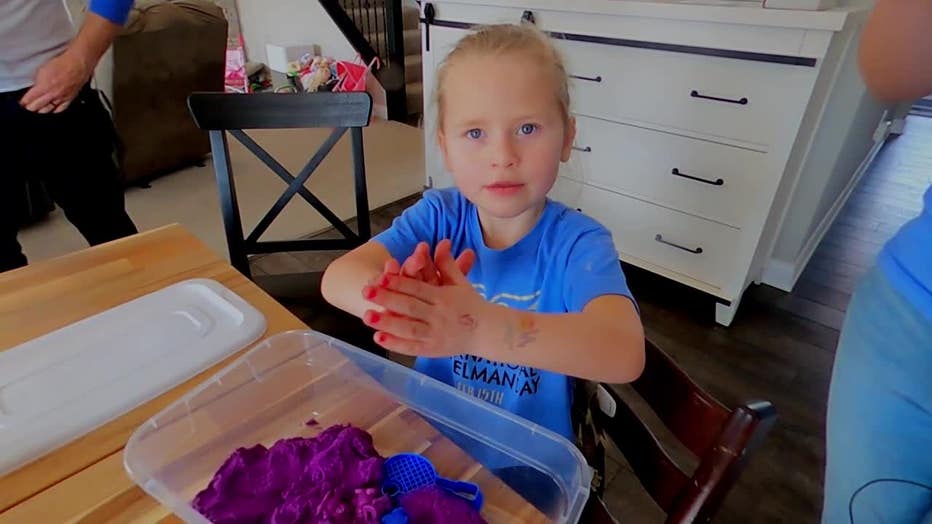Living with Angelman Syndrome: A Minnesota family's tale

Local family shares experience with rare Angelman Syndrome
February 15th is Angelman Syndrome Day in Minnesota, and a local family shares what it?s like for their 5-year-old daughter Rose who was diagnosed with the rare genetic disorder.
NEW BRIGHTON, Minn. (FOX 9) - Rose Smith, a 5-year-old New Brighton girl, is one of 160 Minnesotans with Angelman Syndrome, a rare neurogenic disorder that impacts about one in 15,000 to 20,000 people worldwide.
Rose is a bright, beautiful, loving little girl who is always smiling and giggling.
"She laughs at all your jokes, and it’s consistent, it’s not like she has an off day," Rose's mother Sierra said.
Being almost always happy, with no real tantrums or anger, is one of the wonderful things about Angelman Syndrome.
But there are so many challenges her parents face, day and night. Angelman Syndrome is an issue that affects the 15th chromosome. For Rose and others, it means she doesn’t talk at all, there are balance issues, fine motor skills can be a problem, she has seizures and hyperactivity. Most don’t sleep well. But the biggest and scariest challenge is that people with Angelman's have no real safety awareness, which means for the rest of her life she will have to have 24-hour care.

Rose Smith, a 5-year-old girl who lives in New Brighton, is one of about 160 Minnesotans with Angelman Syndrome. (FOX 9)
There have already been some terrifying moments. Sierra said, "She's very curious. So, I mean, once we figure out how to keep knives away from her, she finds a way to get to the knives, you know?"
"And you can imagine just how frightening it is to have a missing kid. You have no idea where they are. But also, there's that moment of, 'I don't even know how long it's been since I last knew that she was here,'" Alex Smith said.
The signs that something was different about Rose came on very early, which is typical. In the first few months of infancy, Rose had issues with the suck, swallow, and breathe mechanisms. Also, her eyes were wandering. Right around 1 year old, the Smiths got the diagnosis of Angelman Syndrome.
Like most of us, they had never heard of it. It was, and still is, difficult at times to accept.
"You know, immediate grief as any parent might. Starting to think that your hopes and expectations for your kid are not at all what they expected. And it was like any parent, you can just imagine how a parent might feel," said Alex.
Sierra said, "And I would say acceptance is, like, lifelong, right? So I feel like at each milestone, we experience a little bit of grief. Right? So sending her off to kindergarten, not hearing about that first day of school, you know, so there are different we still have grief throughout the different milestones."
Rose gets a lot of therapy and a PC, which is a tremendous help. And while she can’t speak one word, she can communicate in her own wonderful way, like pointing, showing she’s excited, smiling, reaching and hugging.
There’s no real "how-to book" but Rose’s family is growing right along with her; learning how to help her along the way, while at the same time, Rose teaches them what’s most important in life.
"What do I value? Like I value being loved and giving love to others. Right. And that is something that she does without parallel," Sierra said.
There is no cure for Angelman Syndrome, but progress has been made. It used to be those with Angelman’s were institutionalized and that generally is not the case anymore. There is a lot of research happening and trials that provide a lot of hope for Angelman families every day.

